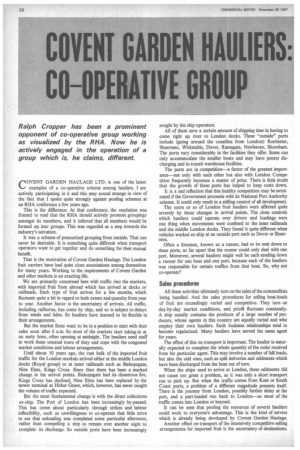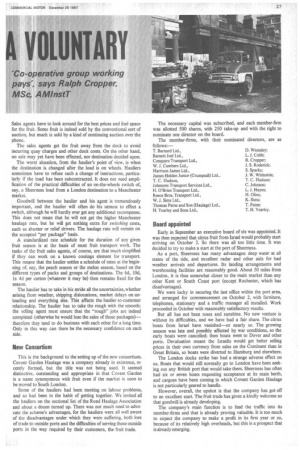COVENT GARDEN HAULIERS: CO-OPERATIVE GROUP
Page 28

Page 29

If you've noticed an error in this article please click here to report it so we can fix it.
Ralph Cropper has been a prominent opponent of co-operative group working as visualized by the RHA. Now he is actively engaged in the operation of a group which is, he claims, different.
COVENT GARDEN HAULAGE LTD. is one of the latest examples of a co-operative scheme among hauliers. I am actively participating in it and this may sound strange in view of the fact that I spoke quite strongly against pooling schemes at an RHA conference a few years ago.
This is the difference. At that conference, the resolution was framed to read that the RHA should actively promote groupings amongst its members, and it inferred that all members would be formed up into groups. This was regarded as a step towards the industry's salvation.
It was a scheme of pressurized grouping from outside. That can never be desirable. It is something quite different when transport operators want to get together and do something for their mutual benefit.
That is the motivation of Covent Garden Haulage. The London fruit carriers have had quite close associations among themselves for many years. Working to the requirements of Covent Garden and other markets is an exacting life.
We are primarily concerned here with traffic into the markets, with imported fruit from abroad which has arrived at docks or railheads. Each type of fruit arrives for a few months, which fluctuate quite a bit in regard to both extent and quantity from year to year. Another factor is the uncertainty of arrivals. All traffic, including railborne, has come by ship, and so is subject to delays from winds and tides. So hauliers have learned to be flexible in their arrangements.
But the market firms want to be in a position to start with their sales soon after 6 a.m. So most of the markets start taking-in at an early hour, often opening at midnight. The hauliers need staff to work these unusual tours of duty and cope with the congested market conditions and labour arrangements.
Until about 10 years ago, the vast bulk of the imported fruit traffic for the London markets arrived either at the middle London docks (Royal group) or at inner railheads such as Bishopsgate, Nine Elms, Kings Cross. Since then there has been a marked change in the arrival points. Bishopsgate had its disastrous fire, Kings Cross has declined, Nine Elms has been replaced by the newer terminal at Hither Green, which, however, has never caught the volume of traffic expected.
But the most fundamental change is with the direct collections ex-ship. The Port of London has been increasingly by-passed. This has come about particularly through strikes and labour inflexibility, such as unwillingness to co-operate that little extra to see that unloading was completed some particular afternoon, rather than compelling a ship to remain over another night to complete its discharge. So outside ports have been increasingly sought by the ship operators.
All of them save a certain amount of shipping time in having to come right up river to London docks. These "outside" ports include (going around the coastline from London): Rochester, Sheerness, Whitstable, Dover, Ramsgate, Newhaven, Shoreham. The ports vary considerably in the facilities they offer. Some can only accommodate the smaller boats and may have poorer discharging and in-transit warehouse facilities.
The ports are in competition—a factor of the greatest importance—not only with each other but also with London. Compe tition frequently becomes, a matter of price. There is little doubt that the growth of these ports has helped to keep costs down. It is a sad reflection that this healthy competition may be terminated if the Government proceeds with its National Port Authority scheme. It could only result in a stifling control of all development.
The score or so of London fruit hauliers were affected quite severely by these changes in arrival points. The close controls which hauliers could operate over drivers and loadings were one thing when movements were confined to the inner railheads and the middle London docks. They found it quite different when vehicles worked ex-ship at an outside port such as Dover or Sheerness.
Often a foreman, known as a runner, had to be sent down to these ports, so far apart that the runner could only deal with one port. Moreover, several hauliers might well be each sending down a runner for one boat and one port, because each of the hauliers was responsible for certain traffics from that boat. So, why not co-operate?
Sales procedures All these activities ultimately turn on the sales of the commodities being handled. And the sales procedures for selling boat-loads of fruit are exceedingly varied and competitive. They turn on day-by-day market conditions, and price% fluctuate constantly. A ship usually contains the products of a large number of producers, whose agents in this country are equally varied and who employ their own hauliers. Such business relationships tend to become regularized. Many hauliers have served the same agent for years.
The effect of this on transport is important. The haulier is naturally expected to complete the whole quantity of the order received from his particular agent. This may involve a number of full loads, but also the odd ones, such as split deliveries and oddments which have been discharged from the boat out of turn.
When the ships used to arrive at London, these oddments did not cause too great a problem, as it was only a short transport run to pick up. But when the traffic comes from Kent or South Coast ports, a problem of a different magnitude presents itself. There is the journey from London, possibly further delay at the port, and a part-loaded run back to London—as most of the traffic comes into London or beyond.
It can be seen that pooling the resources of several hauliers could work to everyone's advantage. This is the kind of service which is already being developed by Covent Garden Haulage.
Another effect on transport of the intensively competitive selling arrangements for imported fruit is the uncertainty of destinations. Sales agents have to look around for the best prices and find space for the fruit. Some fruit is indeed sold by the conventional sort of auction, but much is sold by a kind of continuing auction over the phone.
The sales agents get the fruit away from the dock to avoid incurring quay charges and other dock costs. On the other hand, no sale may yet have been effected, nor destination decided upon.
The worst situation, from the haulier's point of view, is when the destination is changed after the load is on wheels. Hauliers sometimes have to refuse such a change of instructions, particularly if the load has been subcontracted. It does not need amplification of the practical difficulties of an on-the-wheels switch of, say, a Sheerness load from a London destination to a Manchester market.
Goodwill between the haulier and his agent is tremendously important, and the haulier will often do his utmost to effect a switch, although he will hardly ever get any additional recompense. This does not mean that he will not get the higher Manchester haulage rate, but he will get nothing extra for switching costs, such as shunter or relief drivers. The haulage rate will remain on the accepted "per package" basis.
A standardized rate schedule for the duration of any given fruit season is at the basis of most fruit transport work. The tasks of the fruit sales agents, of course, are that much simplified if they can work on a known costings element for transport. This means that the haulier settles a schedule of rates at the beginning of, say, the peach season or the melon season, based on the different types of packs and groups of destinations. The 6d, 10d, Is 4d per carton (whatever it may be) then remains fixed for the season.
The haulier has to take in his stride all the uncertainties, whether arising from weather, shipping dislocations, market delays on unloading and everything else. This affects the haulier-to-customer relationship. The haulier has to take the rough with the smooth; the selling agent must ensure that the "rough" jobs are indeed completed (otherwise he would lose the sales of those packages)— therefore they tend to do business with each other for a long time. Only in this way can there be the necessary confidence on each side.
New Consortium
This is the background to the setting up of the new consortium. Covent Garden Haulage was a company already in existence, recently formed, but the title was not being used. It seemed distinctive, outstanding and appropriate in that Covent Garden is a name synonymous with fruit even if the market is soon to be moved to South London.
Some of the hauliers had been meeting on labour problems, and so had been in the habit of getting together. We invited all the hauliers on the sectional list of the Road Haulage Association and about a dozen turned up. There was not much need to advocate the scheme's advantages, for the hauliers were all well aware of the disadvantages under which they were suffering, both loss of trade to outside ports and the difficulties of serving those outside ports in the way required by their customers, the fruit trade. Board appointed
Early in September an executive board of six was appointed. It was then expected that citrus fruit from Israel would probably start arriving on October 2. So there was all too little time. It was decided to try to make a start at the port of Sheerness.
As a port, Sheerness has many advantages: deep water at all states of the tide, and excellent radar and other aids for bad weather arrivals and departures. Its landing arrangements and warehousing facilities are reasonably good. About 50 miles from London, it is thus somewhat closer to the main market than any other Kent or South Coast port (except Rochester, which has disadvantages).
We were lucky in securing the last office within the port area, and arranged for commencement on October 2, with furniture, telephones, stationery and a traffic manager all installed. Work proceeded in October with reasonably satisfactory results.
But all has not been roses and sunshine. No new venture is without its difficulties, and we have had a fair share. The citrus boats from Israel have vanished—or nearly so. The growing season was late and possibly affected by war conditions, so the early boats were cancelled; then boats went to Dover and other ports. Devaluation meant the Israelis would get better selling prices in their own currency from sales on the Continent than in Great Britain, so boats were diverted to Hamburg and elsewhere.
The London docks strike has had a strange adverse effect on us. Boats that would still normally go to London have been seeking out any British port that would take them. Sheerness has often had six or seven boats requesting acceptance at its main berth, and cargoes have been coming in which Covent Garden Haulage is not particularly geared to handle.
However, overall, the upshot is that the company has got off to an excellent start. The fruit trade has given a kindly welcome so that goodwill is already developing.
The company's main function is to feed the traffic into its member-firms and that is already proving valuable. It is too much to expect the company to make a profit in its first year or so, because of its relatively high overheads, but this is a prospect that is already emerging.












































































